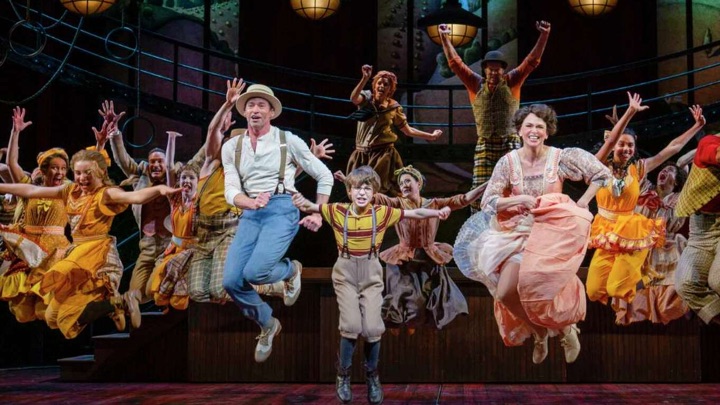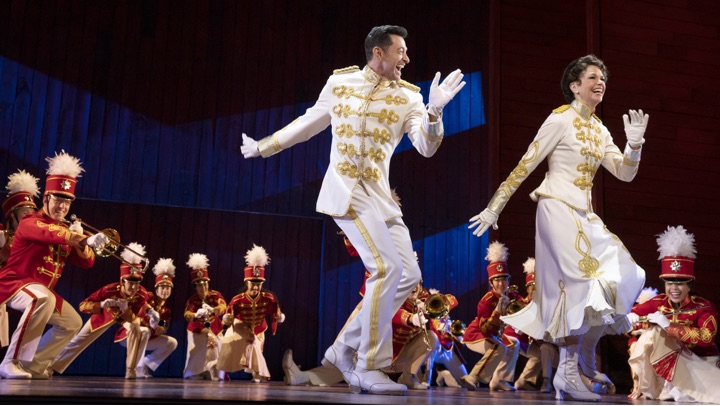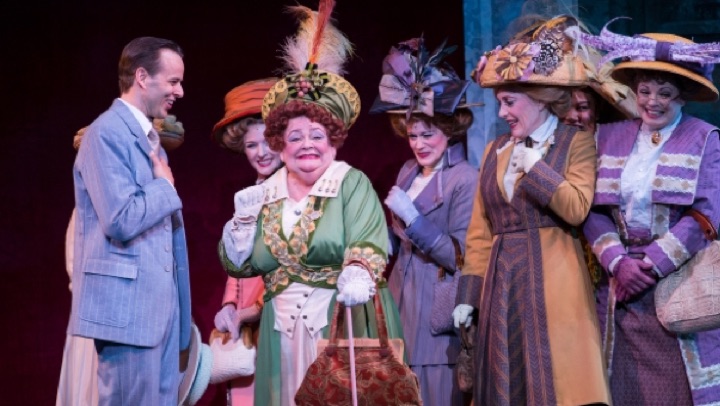
DAVID FOX: Cameron, before we get into the weeds on The Music Man, I’m struck by the ways in which even prior to its opening, this revival became a barometer of the state of Broadway. Originally announced in September 2020 with Hugh Jackman set for the title role, it appeared to be a juggernaut with nothing to stand in its way. The pandemic changed all that, of course—but perhaps even more damaging was the scandal involving abusive producer Scott Rudin.
Rudin withdrew, and the path forward again seemed clearer. But once the show started performances in one of the longest preview periods I can remember, COVID flare-ups among the cast—Jackman and co-star Sutton Foster in particular—became headline news. When the official opening finally was set, press guru Rick Miramontez announced that critics would not be invited in the preview period and would instead be accommodated on opening night.
Miramontez’s statement was so hostile—indeed, so Rudin-esque—that one questions just how far the producer has actually distanced himself from the show. (For the record: we bought our own tickets through Telecharge, a rattling experience that included “bargain” seats listed as available which mysteriously disappeared, and ludicrous service charges for no useful service provided—all of which seemed of a piece with a musical about a hustle.)
When the New York Times review and several other prominent ones were ultimately posted, they were tepid at best. And yet, when we saw the show, at a Wednesday matinee a few days after opening, it was cheered to the rafters by a capacity audience. The Music Man 2022—bloodied, but unbowed.
CAMERON KELSALL: In many ways, seeing a matinee of The Music Man felt as close to a pre-pandemic experience as I’ve had at the theater since Broadway reopened in earnest last fall. Sure, masks remained compulsory and vaccine cards were checked at the door. But there was an energy that surged through the theater that’s been missing elsewhere, especially as the industry continues to struggle through its ongoing rebound.
It also seemed contained entirely to the audience. Jerry Zaks’ high-gloss production, which trades heavily on a bland Americana at odds with the sharp satire of Meredith Willson’s libretto and timeless score, operates on all cylinders but fires on hardly any.
DF: The show itself is one of my absolute favorites, and certainly ripe for revival. Indeed, more than just a revival—a reinvention. The piece is a love story of course, between huckster pitchman Harold Hill and the Iowa town’s unpopular librarian Marian Paroo. But for me, the real love story here is about the Midwest and its complex, often maddening contradictions: warmth and wariness, struggle and celebration, and above all else, a commitment to survival even when the impediments seem overwhelming.
Part of Willson’s genius is that the sparkling wit of the score somehow manages to also underscore the deep pathos of the story—Harold and Marian and many of the others are flawed, but doing the best they can. I’ve longed to see a Music Man that brings this world to the forefront; the Midwest that’s captured in the photographs of Mike Disfarmer or Walker Evans seems so right for this moment.
But that is very far from the one you’ll see at the Winter Garden. As for Zaks, he has become (literally, in the case of Hello, Dolly!) the inheritor of the Gower Champion tradition. There is a clockwork precision to what he does, with every sequence having a kind of “button” on the end – unapologetic showmanship, in bright, even lurid color. It gets the applause it so clearly milks, but for me the glibness of this style has aged very poorly since Champion’s day. In Music Man especially, I want a humanity that is sadly absent here.
CK: Zaks’ production of Hello, Dolly! was also built around a star—in that case, Bette Midler—and also similarly empty. He uses a lot of the same visual touchstones here as he did there. The scenic design, by Santo Loquasto, relies too heavily on a series of painted scrims that suggest an overly general heartland vibe. It creates an impression, which is not counterbalanced by the direction, that all Midwesterners cut from the same crude, dopey cloth.
But that stands in opposition to Willson’s tart lyrics and the rich characterizations with which he invests even the most minor characters. Warren Carlyle’s frenetic choreography further exacerbates this problem—yes, a big Broadway musical can have too many dance breaks, especially when they’re used to avoid having anything particularly insightful to say about the material.
The large ensemble move around the stage like animatronic statues at Disney World, and any sense that this community is unique, complicated, edgy and resistant to change is lost.
DF: Exactly. Reinforcing your last point about the complexity of these characters, for me the “trouble in River City” really begins in the piano lesson scene—a lovely bit of writing that shows several key characters in moments of vulnerability and insecurity, even as they express their desires for something better. Here, it’s played at high speed, with the cast often wearing plastered, performative smiles.
It was heartbreaking to see the great Marie Mullen, whose nuanced performance in Beauty Queen of Leenane was a miracle of subtlety, delivering Mrs. Paroo’s lines with the broad strokes of a vaudeville comic. Winthrop’s embarrassment about his lisp; Marian’s elliptical suggestion that his early life was troubled—all of it gets a too slick reading, ultimately punctuated by Foster’s too loud, too fast, poetry-free “Goodnight, My Someone.”
CK: Foster’s performance never reaches the broadly grotesque level of Mullen, but it remains fairly one-note throughout. Full disclosure: the magic that others have seen in her since her star-is-born performance in Thoroughly Modern Millie 20 years ago has largely been lost on me.
She comes across always as a competent understudy who puts little individual stamp on her roles. Here, she defaults to an eye-rolling smirk for much of the first act—her way of communicating here that she’s on to Hill’s con. Yet when her attitude shifts and she recognizes the positive impact of his grift—that it brings the town together and allows each individual to tap into his or her own humanity—she communicates it mostly through vacant, lovestruck smiles.
But that’s wrong, isn’t it? Marian falls for Harold in spite of his nefarious motives, but she never loses sight of them. Foster’s characterization makes her seem as clueless as the easiest mark.
DF: You know, much has been made of the key changes for Foster, whose high belt is in no way a natural fit for Marian. But to me, what’s really off-key here is more a personality misfit. Foster, whom I admire greatly in the right thing, has a hoydenish vigor that feels at odds with Marian’s yearning. She’s fairly effective in the parlando lead-up to “My White Knight,” which suits her impishness.
But the transition into the lyrical section goes almost entirely unmarked. At times, I thought she was channeling some of Judy Garland‘s mannerisms from her plucky MGM 1940s characters. Foster does it fairly well, but tellingly she has little of the fragile emotionality that was of course a Garland speciality.
CK: There are some actors who give the impression of what a more thoughtful (and worked-through) production might have looked like. Chiefly, Jefferson Mays and Jayne Houdyshell make a delightfully weird combination as Mayor and Mrs. Shinn. Their highly individual takes on these roles underline a particular point that’s lost elsewhere—that small towns, just like big cities, are full of offbeat, interesting people.
The luxurious casting of character actor Remy Auberjenois as Charlie Cowell, the rival salesman bent on exposing Harold Hill’s shell game, brings some real dramatic tension to what could be a throwaway part. And I feel the need to shout out Eddie Korbich, whose ageless tenor (and flawless pitch!) is put to brilliant use in the barbershop quartet.
DF: Mays and Houdyshell, fabulous talents that they are, really go to town on the Shinns, and delightfully so. I had hopes that Shuler Hensley would bring something similarly special to Marcellus, but it’s a curiously flat performance. Perhaps his often rather dark, even sinister quality belongs more in the Music Man of my dreams than the mixed bag here.
I’ll also offer a shout out—to young Benjamin Pajak, making his Broadway debut as Winthrop. There was literally one moment in this production that actually gave me a lump in my throat: Pajak’s sudden entrance in “The Wells Fargo Wagon,” where he finds his voice. After so many scenes notable largely for slick professionalism, for one precious moment here I felt a surge of genuine joy.
CK: Pajak, who can’t be more than 10 years old, exudes a natural ease that’s, sadly, missing entirely from the star performance. When Jackman last appeared on Broadway in a musical—2003’s The Boy from Oz—he owned the stage with charisma to burn. Harold Hill would have seemed a natural fit on the heels of that outing.
But although he remains an irrepressible showman, his work is often obvious and effortful, and I rarely believed an entire town would be taken in by his wiles. Credit where it’s due: there’s no marking here. Jackman was giving 150% percent at the Wednesday matinee. Unfortunately, it showed.
DF: I think by “showed,” what you’re gallantly avoiding saying is that his voice reveals alarming signs of strain, taxed especially by the higher pitches. Again, credit to him for really singing so much of the score, but it’s not a pretty sound. I also think the trademark showmanship on view isn’t quite right here.
When the last Broadway revival opened in 2000, much was made about how hard it is for anyone to displace memories of Robert Preston. I don’t entirely agree—Harold Hill is a great role, and I can imagine many ways into it. But one thing Preston had that I’ve yet to see repeated was a supreme sense of effortlessness, even minimalism. Preston seemed never to break a sweat. He could raise an eyebrow or gesture with one finger and somehow grab our rapt attention in a way that Jackman, with all his awesome vitality, simply doesn’t.
CK: Whether or not any of this matters is highly debatable. As you already said, the audience members paying $500 a pop (or more!) mostly care that Jackman shows up and flashes his megawatt smile, as he does—inappropriately, I’d say—from his first entrance onward. (A woman sitting behind us excitedly muttered “It’s him! It’s him!” as he tried to keep his face covered by a newspaper during “Rock Island”.)
And that’s another issue with his work here. I think Jackman can be a fine actor, but this was the first time I felt like he was completely unable, or unwilling, to suggest any of the darkness beneath Harold Hill’s gregarious facade. He was often, to put it crudely, fucking the audience—and they were more than happy to bend over. Perhaps it’s obvious to expect that from a star, but it doesn’t serve the material one bit.
DF: “Fucking the audience.” Well, I can’t top that, and I won’t try. I think it’s time for me to de-train the Rock Island Line. I’ll hope for a smoother trip next time.




























Comments